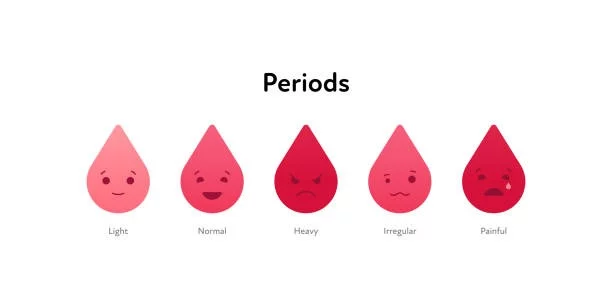Irregular periods can be more than an inconvenience—they may signal underlying health issues. This article explores what irregular periods are, their potential causes, and why it’s important to address these changes for your overall well-being.
What Are Irregular Periods?
Before we get into the deeper causes, let’s first clarify what irregular periods mean. A typical menstrual cycle lasts between 21 to 35 days, with menstruation (your period) lasting about three to seven days. If your cycle frequently falls outside this range, or if its duration, flow, or symptoms vary significantly, then your periods can be considered irregular.
Signs of irregular periods include:
- Skipping a cycle or going months without menstruating (amenorrhea)
- Periods that come earlier or later than expected
- Heavier or lighter-than-normal bleeding
- Spotting between periods
- Pain or discomfort worse than usual
While occasional irregularities may not be a big deal, persistent changes can often be an indicator of something else happening within your body.
Common Causes of Irregular Periods
Irregular periods can happen for various reasons, ranging from lifestyle factors to medical conditions. Here’s a look at the most common causes:
Stress and Lifestyle Factors
Your body reacts to stress in unexpected ways, and menstrual irregularities are often a byproduct. Physical or emotional stress can disrupt the hormones that regulate your cycle. Factors like excessive exercise, rapid weight loss, poor diet, or lack of sleep can also throw your system off balance.
Stress triggers the release of cortisol, which can interfere with your hypothalamus, the part of your brain responsible for regulating hormones that control your cycle. This can cause your periods to become irregular or even stop entirely.
Hormonal Imbalances
Hormonal fluctuations often lie at the heart of irregular periods, with two conditions being particularly common in women:
- Polycystic Ovary Syndrome (PCOS): PCOS is a hormonal disorder affecting 1 in 10 women of childbearing age. To support overall hormonal balance and symptom management, many turn to targeted solutions like PCOS vitamins for women.
- Thyroid Disorders: Your thyroid gland controls metabolism, but its dysfunction (hypothyroidism or hyperthyroidism) can disturb your menstrual cycle. If you’re experiencing symptoms like fatigue, weight changes, or sensitivity to temperature alongside irregular periods, it might be time to seek help with hypothyroidism. Glenview experts can provide.
Birth Control Use
If you recently started or stopped using hormonal birth control, irregular spotting or periods might occur as your body adjusts. Similarly, long-term use of certain contraceptives can influence your cycle until the hormones fully clear your system.
Perimenopause
For women in their 40s (or sometimes even earlier), irregular periods may signal the transition toward menopause. During perimenopause, shifting hormone levels can lead to changes in cycle pattern, flow, and associated symptoms like hot flashes or mood swings.
Underlying Medical Conditions
Sometimes, irregular periods can point to more serious health conditions, such as:
- Endometriosis: A condition where uterine lining tissue grows outside the uterus, causing heavy or painful periods.
- Fibroids or Polyps: Benign growths in the uterus can disrupt normal bleeding patterns.
- Diabetes: High blood sugar may affect hormone regulation and cause irregularities.
- Eating Disorders: Conditions like anorexia or bulimia can halt periods if the body lacks sufficient energy reserves.
Why You Shouldn’t Ignore Irregular Periods
Irregular periods often feel easy to dismiss, especially if they don’t interfere heavily with your daily life. However, unaddressed changes in your cycle can lead to further complications. Here’s why seeking medical advice is essential:
- Fertility: If you’re planning future pregnancies, untreated conditions like PCOS or thyroid disorders can make conceiving more difficult.
- Underlying Health Risks: Irregular periods can sometimes signal bigger health concerns, such as diabetes, heart disease, or even reproductive organ cancers.
- Quality of Life: Painful or unpredictable periods can affect your mood, energy levels, and overall well-being.
Remember that your cycle is a vital sign, much like your pulse or blood pressure. Changes to it can reflect changes in your internal health.
When to See a Doctor
While one or two irregular cycles may not require immediate medical attention, here are some key signs that it’s time to consult your doctor:
- Your periods stop completely for three months or more without explanation.
- You experience significant pain during menstruation.
- Bleeding becomes excessively heavy or lasts longer than seven days.
- You notice other symptoms like fatigue, unexpected weight changes, or acne flare-ups.
- There’s a family history of hormonal disorders, such as PCOS or thyroid dysfunction.
Your doctor may perform tests, such as hormone panels, ultrasounds, or thyroid function examinations, to determine the issue and recommend the best course of action.
Steps to Regulate Your Periods
While professional medical advice is essential, there are several lifestyle habits you can adopt to maintain a healthier cycle:
- Stress Management: Practice mindfulness, yoga, or meditation to help manage stress levels.
- Healthy Diet: Eat a balanced diet rich in whole grains, lean proteins, fruits, and vegetables. Avoid overly restrictive diets that might deprive your body of essential nutrients.
- Stay Active: Regular moderate exercise improves hormone balance, but avoid overtraining, which can complicate menstruation.
- Keep Track of Your Cycle: Use period-tracking apps to monitor changes and better understand your body.
Conclusion
Your menstrual cycle is far more than just a monthly event. It’s a window into your overall health and well-being. By understanding what irregular periods might mean and acting early, you can not only address potential issues but also improve your quality of life.

Lexy Summer is a talented writer with a deep passion for the art of language and storytelling. With a background in editing and content creation, Lexy has honed her skills in crafting clear, engaging, and grammatically flawless writing.



